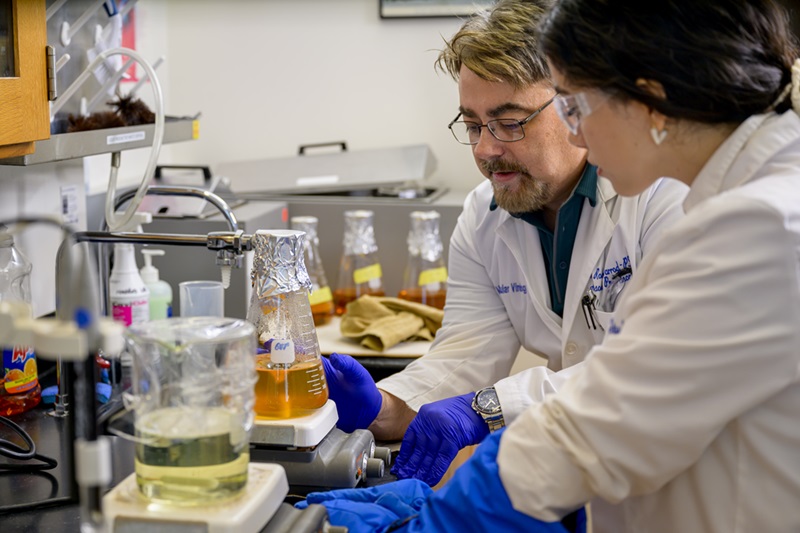Engineering cell pathways to prevent cancer
Hands-on research opportunities in the lab prepare undergraduate students to tackle real-world challenges

When Makenna Keating chose SMU Lyle School of Engineering for her undergraduate degree, she hoped for a career designing first-person shooter video games. Little did she know she’d end up targeting and destroying a different, real-life enemy: cancer cell development.
“I chose SMU because I know that computer science, gaming and engineering were highly rated here,” she said. “I wanted to study engineering because I love knowing how things work. But I started getting really interested in my science classes, and my intro to biology professor inspired me to go into a more science-focused route.”
Keating, a mechanical engineering major with a specialty in biomedical, is among a group of undergraduate students conducting lab research with Dr. Robert Harrod, a Biological Sciences professor at SMU’s Dedman College of Humanities and Sciences studying how viruses cause cancer.
— Thinking grad school? Think SMU Lyle. Apply now through Jan. 2 for Spring 2024.
Nearly 20% of human cancers are caused by oncogenic viruses, but the molecular biological and biochemical events underlying these diseases aren’t well understood. Students in Dr. Harrod’s lab are examining the molecular mechanics of the process – much like a mechanical engineer would disassemble and dissect a complex machine to see how the components work.
“Cells are much like robots or small machines that require energy,” Dr. Harrod said. “Student researchers are studying their mechanics and identifying the pathways that lead to cancer development so we can throw a wrench into them. As a result of this research, we’ve actually been able to prevent tumorigenesis in mice.”
Lab-based learning at the molecular level
Keating’s research is focused on the underlying factors of how the Human Papillomavirus (HPV) reprograms healthy cells to cause cancer. This involves preparing DNA, examining cell molecules, and watching how they interact with one another in the disease process.
“I love seeing the nitty-gritty of biomechanics and peering into cancer,” she said. “My favorite recent experiment involved overexpressing a protein in the cancer pathway. This caused the cell to extend tunneling nanotubules to other cells in an attempt to siphon their mitochondria and steal their power. It was amazing to see under the microscope!”
Makenna Keating is a mechanical engineering major with a specialty in biomedical conducting lab research with Dr. Robert Harrod
Dr. Harrod said SMU gives undergraduate students more hands-on opportunities to work with the lab, more research done at the molecular level and more personal interaction with faculty compared to other universities.
“It’s important for undergraduate students to learn how viruses can cause cancer and how healthy cells become cancerous, especially for a pre-med student like Makenna who wants to become a doctor in the future,” he said. “If you’re going to treat cancer, you have to understand how the disease works and how the medicine targets the cells.”
For Keating, who has witnessed friends and family deal with the impact of cancer, working on this type of research is meaningful.
“The end goal is to create a basis for cancer therapy in the future, and working toward that is important to me,” she said. “I really enjoy helping people, and this is a great route to do that.”
About the Bobby B. Lyle School of Engineering
SMU’s Lyle School of Engineering thrives on innovation that transcends traditional boundaries. We strongly believe in the power of externally funded, industry-supported research to drive progress and provide exceptional students with valuable industry insights. Our mission is to lead the way in digital transformation within engineering education, all while ensuring that every student graduates as a confident leader. Founded in 1925, SMU Lyle is one of the oldest engineering schools in the Southwest, offering undergraduate and graduate programs, including master’s and doctoral degrees.
About SMU
SMU is the nationally ranked global research university in the dynamic city of Dallas. SMU’s alumni, faculty and nearly 12,000 students in eight degree-granting schools demonstrate an entrepreneurial spirit as they lead change in their professions, community and the world.
